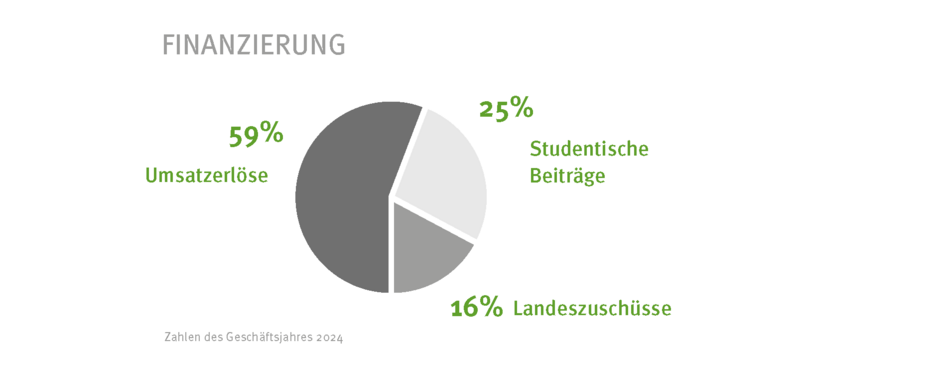How is the Studierendenwerk Frankfurt am Main financed?
The Studierendenwerk Frankfurt am Main is a social economy enterprise with a legal mandate to manage refectories, cafés and student residences, to implement BAföG and to advise of around 70,000 students. Making it possible for young people to study - that is what more than 400 employees are committed to every day. Inexpensive housing, food and drink, BAföG and student financing, good advice and support - our facilities and services ensure that studying is a success. The Studierendenwerk Frankfurt am Main is also an important partner of the universities and, with annual revenues in the double-digit million range, an economic player in the Rhine-Main region.
We would like to offer our students the best inexpensive service. At the same time, however, we must pay attention to sufficient income, because only an economically sound Studierendenwerk can be permanent. It is one of the most important tasks for our management and our board of directors to keep the balance between customer-friendly pricing and the necessary financial security.
Semester contribution - for what?
If students submit their so-called "semester contribution" as part of their enrolment or confirmation of studies, it also includes a contribution to the Studierendenwerk Frankfurt am Main. The contribution levels vary according to the university.
This solidarity fee is similar to the principle of illness or unemployment insurance: it finances a wide range of offers, which are open to all students of our universities, but are independent of individual demands.
This means that our services, which support the university life, are not directly connected with one another. For example, counseling services are usually used by those who are concerned, not everybody goes to the cafeteria on a daily basis or lives in a residential hall of the Studierendenwerk.
However, semester contributions represent only a quarter of our income. The majority, which is more than half, is generated by ourselves, less than 20 percent are state subsidies. In addition, there are other services provided by the state of Hesse, which finance the establishment of canteens and cafes, offer free heritable building sites for resident hall construction, or provide low-interest construction loans. For some years now, the city of Frankfurt am Main has also been supporting the construction of student residences.
Following a cutback in funding for social issues to the Hessian student unions by the State of Hesse in 2004 and a further 10 years in which funding was not increased - despite a sharp rise in student numbers by 50 % - and was well below the national average, funding was increased again from 2015 onwards. Since then, it has been possible to keep students' semester fees and the prices in the catering facilities stable. Public funding contributes to inexpensive offers and thus to equal opportunities for students.

